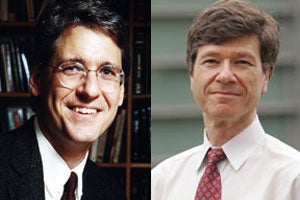Lawyers and leaders must do a better job of recognizing the intermeshed dilemmas posed by an overcrowded planet and an increasingly interconnected globe.
That was the message delivered by world renowned economist Jeffrey Sachs in a recent lecture at Harvard Law School.
Sachs came to HLS in September at the invitation of Professor Jon Hanson, who told students: “This is a great moment for Harvard Law School and Harvard Law students to be thinking about the kinds of things that Professor Sachs writes about. … [It’s] not just the brilliance and energy he brings to big problems, the planet’s biggest arguably, but also that he asked those questions, asks them in a way that is creative and reminds us that these are questions we should be asking as well. With a different mindset and creativity and some leadership from the likes of Professor Sachs, we can actually begin to solve these problems.”
Sachs, currently the director of the Earth Institute at Columbia University, is widely considered to be the leading international economic adviser of his generation. He emphasized that the world faces many grave problems and he bewailed the ignorance of leaders about the desperate straits of marginalized communities living in the world’s poorest places. The direct connection between the hurricanes and tsunamis that have killed hundred of thousands in recent years and the economic and environmental policies of Western democracies is being generally ignored, he said. Sachs has made it his mission is to educate others about these connections and to fight for change. View webcast here.
Sachs urged his audience of law students to use the technical skills that they were gaining in the service of ethical goals and to combat environmental and economic disparities that are spurring ethnic conflict across the globe. Specifically, he called for lawyers to support the legal foundations of international treaties that will be necessary to deal with worldwide environmental problems. More broadly, Sachs shared his belief that that the world’s social problems could only be solved if people become more scientifically literate. He pointed out that many crucial threats facing the planet are recognized by the scientific community many years before the public recognizes them. Sachs recommended that everyone read Science to keep abreast with new developments that may have important bearing on social problems.
Twice named one of the world’s most influential people by Time magazine, Sachs is also special adviser to United Nations Secretary-General Ban Ki-moon and president and co-founder of Millennium Promise Alliance, a non-profit organization aimed at ending extreme global poverty. He is the author of numerous books, including, most recently, “The End of Poverty” and “Common Wealth,” in which he challenges wealthy nations to rethink their basic assumptions about global wealth.
Sachs’ appearance was organized by Hanson, with help from faculty assistant Carol Igoe, Jon Taylor ’10 and an inter-year committee of students from Section VI.
Adapted from 3L Sam Flak’s article in the Harvard Law Record
